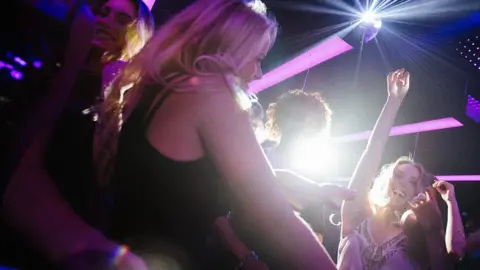Spiking: Public inquiry asks people to share stories
 Getty Images
Getty ImagesPeople in the UK are being urged to share their experiences of being spiked, as part of a public inquiry launched this week.
It follows recent reports of women, many of them students, being spiked by injection on nights out.
The inquiry is taking evidence until 19 January.
The Commons Home Affairs Committee, which is running it, said it wanted to understand "what more can be done to stamp this out".
In the past, spiking has been thought of as substances being put into drinks - but incidences involving needles have been reported in recent months.
Police chiefs were asked to urgently assess the scale of spiking in October, and Home Secretary Priti Patel asked forces for an update.
Around the same time, women across the UK boycotted nightclubs for a so-called "Girls Night In".
Mia Davson, 20, a second-year student at Loughborough University, told the BBC at the time she had felt unsafe going out ever since a night when she believed she was spiked.
"I was out cold and completely unresponsive for about an hour and they said they were taking me to hospital," said Ms Davson, who took part in the boycott.
She said change would not "happen overnight" and there needed to be "a nationwide discussion".
The Home Affairs Committee cited statistics published in a YouGov poll in November, which suggested one in nine women and one in 17 men in the UK say they have been the victim of drink spiking.
It is running an online survey until 5 January, asking people who have experienced or witnessed spiking to explain what happened and what support they were given following the incident.
It is also asking the public to write in about how widespread spiking is, and how it should be addressed, until 19 January.

Tim Loughton, MP for East Worthing and Shoreham and acting chairman of the Home Affairs Committee, said the prevalence of spiking was "poorly understood".
"That is why as part of this inquiry we have launched a survey to hear directly from victims about what happened to them and how they were supported," he said.
"We also want to hear from those who have witnessed spiking incidents and have experience in supporting victims so we can understand their perspectives."
Mr Loughton added that the committee wanted to understand "how victims can be better supported in reporting these incidents and dealing with the long-term consequences", as well as the role police can play.
Larissa Kennedy, president of the National Union of Students, said there must be "person-centred, trauma-centred support for those impacted by these horrific acts".
"More broadly, we need to see a culture shift across society, rooted in accountability and transformative justice, to ultimately end sexual violence and gendered violence," she said.
Michael Kill, head of the Night Time Industries Association, which asked for an inquiry in October, said the announcement had been welcomed by the companies it represented.
"This... will go a long way to gaining a level of understanding of these crimes, the breadth of the issue, where they are most prevalent, and handling of drink spiking cases across the UK," he said.
"We are keen to support the inquiry as an industry, and hope that this can be completed quickly so that we can collectively tackle these abhorrent crimes within society."
Last week, Deputy Chief Constable Jason Harwin, the National Police Chiefs' Council lead for drugs, said "several" arrests related to spiking had been made in recent months.
"Tackling the issue of spiking remains a priority for policing and our national coordination and analysis of reports is ongoing," he said.
"In the lead up to Christmas, a time when we know more people are likely to go out, forces have plans in place to respond, with an increased police presence across local hotspots, including bars, pubs and entertainment venues."
He urged people to report spiking and said reports would be "investigated and taken seriously".
